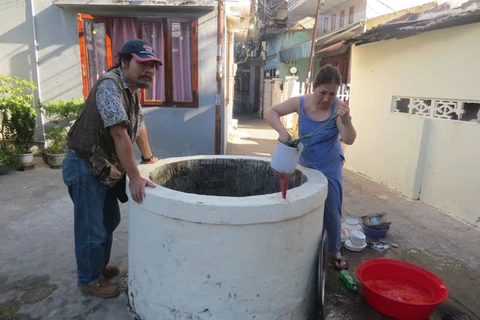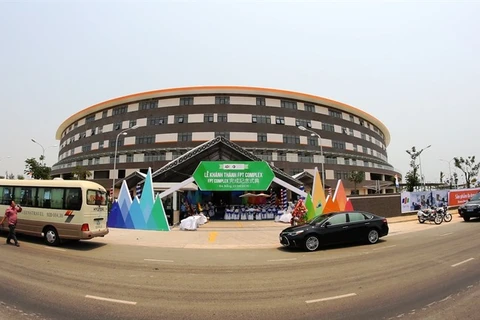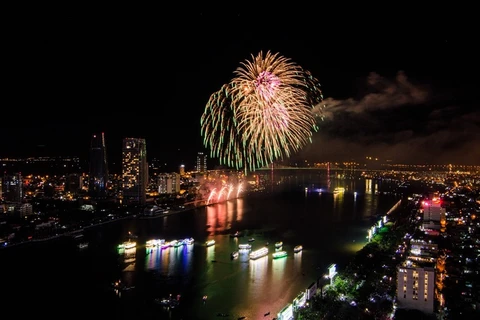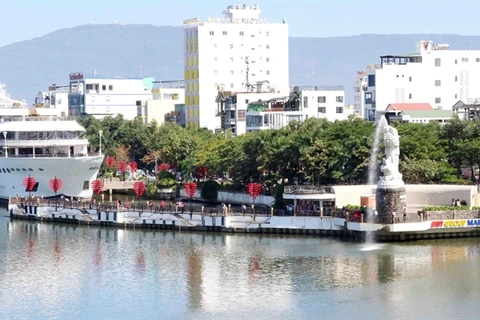Da Nang (VNS/VNA) - Experts, scientists and architects agreed that a construction boom along the Han River in Da Nang city over past decade had impacted on the river flow, erosion and floods, and could result in environmental tragedy in the future.
The above opinions were discussed at a conference on the development of real estate projects in the central city on May 7 following public concerns of construction projects.
The conference, which was hosted by the city’s Fatherland Front, heard reports from scientists and experts reviewing the environmental impacts the Marina Complex and the Olalani Riverside Tower projects exert on the east Han River.
Architect Hoang Su, from the city’s architecture and planning association, said 2,000ha of land, lakes and ponds in the Han River upstream – which used to contain 60 million cu.m of flood water – had been cleared for the development of 10 urban and property projects in the past 10 years.
He added that urban and property projects including Nam Viet A, Hoa Xuan, EuroVilla and booming high-rise buildings along the Han River had occupied large area of the river banks.
Chairman of the city’s architecture and urban association Phan Duc Hai said some projects had narrowed the Han Estuary from 700m down to 560m or even 500m.
"Nhu Nguyet Road had taken up 100m of the river to the west, while a seafood processing zone had taken 200m down the river to the east. New urban and living quarters had been built on the backfilled river expansion area from 2005-12,” Hai said.
He urged for an independent reassessment on the environmental impact of the property projects.
He also asked for transparency regarding reassessment information of these projects.
Tran Van Thiet, vice chairman of the city’s union of science and engineering organisations, raised his doubts about the legality of the Marina Complex as it had been adjusted four times between 2009-17.
He said the city had reduced the scale of the project from 17.5ha to 11.7ha.
In the final adjustment decision in 2017, the city reduced plans for the project from 13 towers to two towers and 57 villas.
Nguyen Thi Nhu Loan, CEO of Quoc Cuong Gia Lai Company, said the Marina Project had been reduced by 40 percent from the city’s initial approval in 2011.
She said the area for public transport and parks was increased from 0.7ha to 2.4ha in the final plan in 2017.
Nguyen Quang Hai, director of My Phuc, the owner of the Olalani Riverside Tower project, said the project had been cut from six 38-storey buildings in 2008 to three 25-storey buildings in 2017.
He said the project had completed infrastructure and river dykes for the project.
Vice chairman of the Da Nang city People's Committee Dang Viet Dung said the city had asked relevant departments and agencies to check and inspect the legal framework and environmental impact of property projects on the Han River.
Dung said the city would submit detailed reports on the project to the Prime Minister soon. — VNS/VNA
The above opinions were discussed at a conference on the development of real estate projects in the central city on May 7 following public concerns of construction projects.
The conference, which was hosted by the city’s Fatherland Front, heard reports from scientists and experts reviewing the environmental impacts the Marina Complex and the Olalani Riverside Tower projects exert on the east Han River.
Architect Hoang Su, from the city’s architecture and planning association, said 2,000ha of land, lakes and ponds in the Han River upstream – which used to contain 60 million cu.m of flood water – had been cleared for the development of 10 urban and property projects in the past 10 years.
He added that urban and property projects including Nam Viet A, Hoa Xuan, EuroVilla and booming high-rise buildings along the Han River had occupied large area of the river banks.
Chairman of the city’s architecture and urban association Phan Duc Hai said some projects had narrowed the Han Estuary from 700m down to 560m or even 500m.
"Nhu Nguyet Road had taken up 100m of the river to the west, while a seafood processing zone had taken 200m down the river to the east. New urban and living quarters had been built on the backfilled river expansion area from 2005-12,” Hai said.
He urged for an independent reassessment on the environmental impact of the property projects.
He also asked for transparency regarding reassessment information of these projects.
Tran Van Thiet, vice chairman of the city’s union of science and engineering organisations, raised his doubts about the legality of the Marina Complex as it had been adjusted four times between 2009-17.
He said the city had reduced the scale of the project from 17.5ha to 11.7ha.
In the final adjustment decision in 2017, the city reduced plans for the project from 13 towers to two towers and 57 villas.
Nguyen Thi Nhu Loan, CEO of Quoc Cuong Gia Lai Company, said the Marina Project had been reduced by 40 percent from the city’s initial approval in 2011.
She said the area for public transport and parks was increased from 0.7ha to 2.4ha in the final plan in 2017.
Nguyen Quang Hai, director of My Phuc, the owner of the Olalani Riverside Tower project, said the project had been cut from six 38-storey buildings in 2008 to three 25-storey buildings in 2017.
He said the project had completed infrastructure and river dykes for the project.
Vice chairman of the Da Nang city People's Committee Dang Viet Dung said the city had asked relevant departments and agencies to check and inspect the legal framework and environmental impact of property projects on the Han River.
Dung said the city would submit detailed reports on the project to the Prime Minister soon. — VNS/VNA
VNA
























